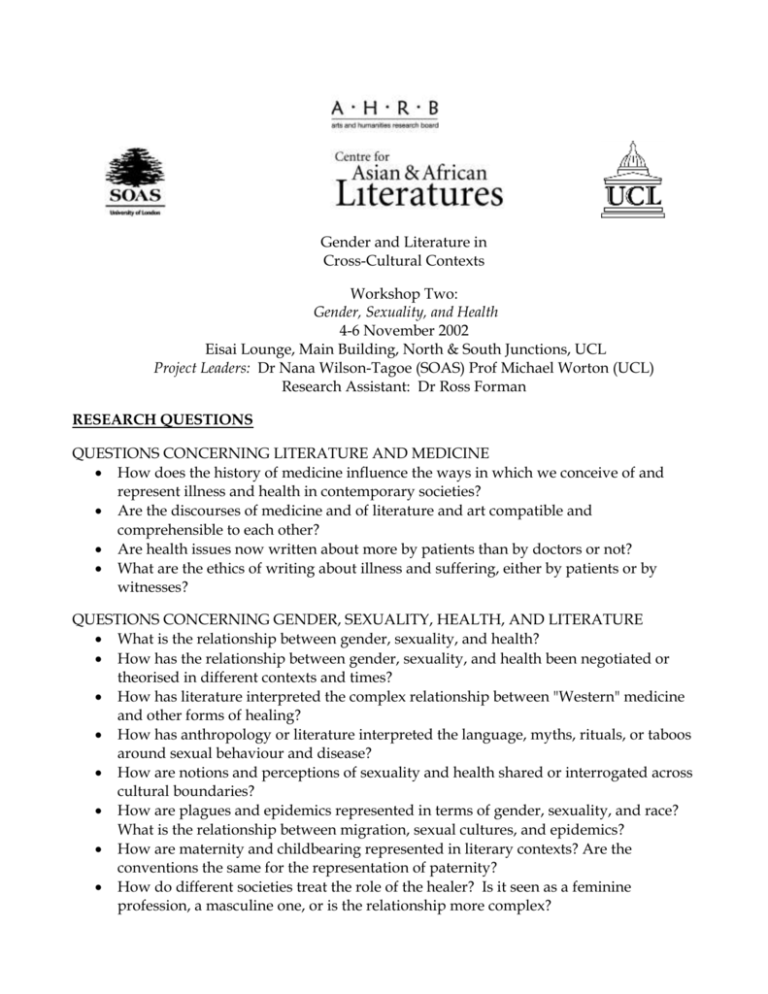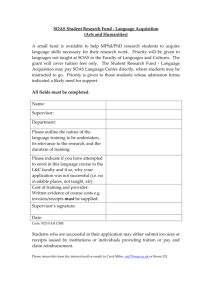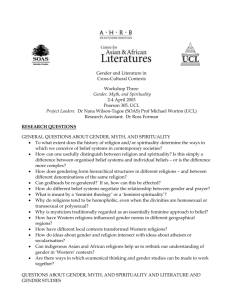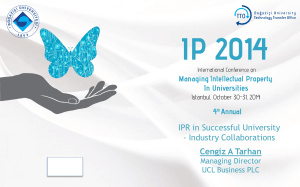
Gender and Literature in
Cross-Cultural Contexts
Workshop Two:
Gender, Sexuality, and Health
4-6 November 2002
Eisai Lounge, Main Building, North & South Junctions, UCL
Project Leaders: Dr Nana Wilson-Tagoe (SOAS) Prof Michael Worton (UCL)
Research Assistant: Dr Ross Forman
RESEARCH QUESTIONS
QUESTIONS CONCERNING LITERATURE AND MEDICINE
How does the history of medicine influence the ways in which we conceive of and
represent illness and health in contemporary societies?
Are the discourses of medicine and of literature and art compatible and
comprehensible to each other?
Are health issues now written about more by patients than by doctors or not?
What are the ethics of writing about illness and suffering, either by patients or by
witnesses?
QUESTIONS CONCERNING GENDER, SEXUALITY, HEALTH, AND LITERATURE
What is the relationship between gender, sexuality, and health?
How has the relationship between gender, sexuality, and health been negotiated or
theorised in different contexts and times?
How has literature interpreted the complex relationship between "Western" medicine
and other forms of healing?
How has anthropology or literature interpreted the language, myths, rituals, or taboos
around sexual behaviour and disease?
How are notions and perceptions of sexuality and health shared or interrogated across
cultural boundaries?
How are plagues and epidemics represented in terms of gender, sexuality, and race?
What is the relationship between migration, sexual cultures, and epidemics?
How are maternity and childbearing represented in literary contexts? Are the
conventions the same for the representation of paternity?
How do different societies treat the role of the healer? Is it seen as a feminine
profession, a masculine one, or is the relationship more complex?
How are physical and psychic realms connected in the management and representation
of sexuality and disease in different cultural contexts?
How are questions of lineage and eugenics represented?
How are issues of psychology and psychiatry gendered?
What is the relationship between prostitution and health in literary and cultural
contexts?
How are various forms of addiction (including to drugs, alcohol, and sex) gendered?
Monday, 4 November
2-2.30
Registration and Tea/Coffee
2.30
Nana Wilson-Tagoe (Africa, SOAS)
Opening Remarks
3.0-4.30
Chair: Clare Hemmings (Gender Institute, LSE)
Rachel Harrison (South East Asia, SOAS)
The Downward Spiral of Sexual Over-indulgence: Morality, Ill-Health and
Retribution in Thailand's Classic Erotic Novel, The Story of Jan Daraa
Caroline Warman (French, Nottingham)
Custine and Amiel: Negotiating through Gender and Ill-Health in 19th-Century Europe
4.30-5.00
Break
5.0-6.30
Chair: Farouk Topan (Africa, SOAS)
Banu Helvacioglu (Political Science, Bilkent)
Translating Gender in Turkish Literature: Moral Imperatives of Being a Wo/man
Stephen Quirke (Petrie Museum, UCL)
Reading Gender in Ancient Egyptian Healing Papyri
8.00
Dinner at Silks and Spice, Foley Street. (£5 contribution for non-speakers).
Tuesday, 5 November
9-9.30
Tea/Coffee
9.30-11
Chair: Nanneke Redclift (Anthropology, UCL)
Michael Worton (French, UCL)
Behold the (Sick) Man
Shigehisa Kuriyama (International Research Center for Japanese Studies, Kyoto)
Angry Women and the History of Medicine
11-11.30
Break
11.30-1
Chair: Sally Lui (English, Warwick)
Philippa Levine (History, University of Southern California)
Sex, Gender and the Language of Sanitary Reform in the Late 19th-Century British Empire
George Rousseau (English, De Montfort)
The Fundamental Riddle of Cholera: Sex, Gender and Representations
of the Fundament in the Construction of Disease
1-2
Lunch (Old Refectory)
2-3.30
Chair: Jane Fenoulhet (Dutch, UCL)
Nicola Mai (Cultural Studies, Sussex)
Albanian Masculinities, Sex-work and Migration:
Homosexuality, AIDS and Other Moral Threats
Audrey Prost (Anthropology, UCL)
Tuberculosis and Gender in the Tibetan exile context: Infectious Social Change
3.30-4
Break
4-5.30
Chair: Dr Wen-Chin Ouyang (Near and Middle East, SOAS)
Nahid Toubia (President, RAINBO)
Female Circumcision As a Two -Way Mirror of Reflection on Self and the Other
Debbie Kirklin (Population Science/Centre for Medical Humanities, UCL)
Poetry, Prose and the Sexual Demographics of Health
Wednesday, 6 November
9-9.30
Tea/Coffee
9.30-11
Chair: Ada Rapoport-Albert (Hebrew and Jewish Studies, UCL)
Margaret Healy (English, Sussex)
Dangerous Blood: Menstruation, Medicine and Myth in Early Modern England
Basim Musallam (Oriental Studies, Cambridge)
Ideas of ‘Femaleness' in a 14th-Century Arabic Discussion
11-11.30
Break
11.30-1
Chair: Wendy Bracewell (SSEES)
Nana Wilson-Tagoe (Africa, SOAS)
The Semantics and Politics of Childbearing and Motherhood
in Contemporary African Writing
Dimitar Kambourov (Literary Studies, Sofia)
The Weakness of Being Man, The Sickness of Being Woman:
The Balkan Postmodern, Gender Roles and the Curse of Inbetweenness
1-2
Lunch (Old Refectory, UCL)
2-3.30
Chair: Stephen Dodd (East Asia, SOAS)
Peter Jackson (Pacific and Asian Studies, Australian National University)
A Brief History of Thai Discourses of Gender/Sex Perversion
Ross Forman (AHRB Centre)
Jacobus X Marks the Spot: Imperialism, Sexology, and Pornography
in The Untrodden Fields of Anthropology and The Crossways of Sex
3.30-4
Break
4-5.30
Chair: Amina Yaqin (South Asia, SOAS)
James Agar (French, UCL)
Remembrance of Health Lost: Dis/Figuring Africa in European AIDS writing
Lynda Morgan (Africa, SOAS)
Vulnerable Margins: The Iconography of Blood, Dirt, and Disease in the Early TwentiethCentury South African Settler Novel
5.30
Michael Worton (French, UCL)
Closing Remarks




![For the full programme click here [Word]](http://s3.studylib.net/store/data/007111369_1-4e0187ff3f28659c587dbc936eb75aec-300x300.png)



